Proof That It’s Pre-Code
- Rasputin, the charmer, is clearly blackmailing women into having sex with him.
- Rasputin invokes God quite often, saying that his powers derive from a heavenly mandate. Even though the film doesn’t have him speaking to angels, there’s clearly something mystic about him that the film refuses to explore.
- There’s a rape– only there’s not. It’s apparent it happens, but it doesn’t. More on that in the ‘Trivia’ section.
Rasputin and the Empress: Quit Russian Me
“Power is the only thing that matters in the world, but you must know how to use it.”
This may come as a surprise, but I studied Russian history in college. I took pair of courses in one semester, one about imperial Russia and the other about Soviet Russia. It was a fascinating pair of classes, even if both involved the last Russian professor on campus going down a checklist of his own notes and telling stories of his own travels to Russia. (“Siberia is actually quite pretty. I have no idea why it was considered a punishment to be sent there.”)
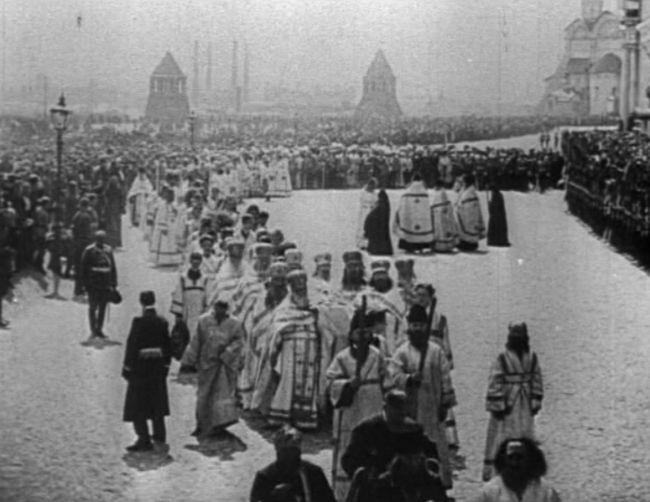
The movie helpfully contains stock footage of Russia’s pre-Revolutionary days, and it’s fascinating.
It’s hard to imagine, after decades of being taught the inevitability of America’s victory in the Cold War and the structural weakness of the Soviet, just what a colossal paradigm shift the Russian Revolution was at the time of its occurrence, both to the country itself and the world at large. Only the French Revolution, with its blood-soaked upheaval of the class structure that has served Western civilization so grossly over the centuries, could be held to compare. Of course, the reasons why a godless communist Russia didn’t work out is all too apparent now– why an industrial workers revolution in a country that was barely industrialized?
But, like a lot of things, there was more to it than that, including a hodgepodge of Russian Czars who’d led the populace of Russia for three centuries of whiplash, from one terrible ruler and bloody upheaval to another not-quite-as-bloody-as-the-last-one bloodbath and then back to the oh-god-look-at-all-this-blood upheaval just to put the cycle back on its feet. In studying the Romanovs, it’s much easier to count the incompetent, backwards leaders than those who strove to modernize or help Russia in any way. (For example, in the latter camp, I count two.)
It also helps to know that there was no equivalent to the Renaissance in Russia, no period where the arts and sciences flourished against the mammoth state religion. Russia was a sprawling empire with limited communication and a large class of poor working farmers. When called upon to die en masse for a monarchy flush with wealth and greed for no reason other than to satisfy their own ambitions, it’s not a surprise that a revolution happened– though the brutality and the cold dictatorship that replaced it weren’t exactly improvements.
I mention all of this because you will get absolutely none of it from Rasputin and the Empress, a mix between high horror and slovenly dramatics. Metro Goldwyn Mayer, who assembled the film to cash in on the success of Grand Hotel, has a weird issue with imperial monarchies which you can see clearly both here and in their 1938 version of Marie Antoinette with Norma Shearer: they fetishize them. In both movies, these historically brutal regimes are shown to be happy families, ruined not so much by greed and depravity than by a few ‘bad apples’ who are so power hungry that they ruin the heroic leader’s opportunity’s to create real reform which they were totally getting to in just a minute. Let them just finish starving everyone first.
The Russian Revolution was still recent history to many of the people involved in making Rasputin and the Empress, so the fetishization is unsurprising since, even in the early 1930s, everyone was mortified about what had happened. Thus the Romanovs were a saintly family, led astray by one greasy madman and on the cusp of making Russia a beautiful utopia until those rapacious Bolsheviks mucked along.
The story proper: it’s a time of great political upheaval in the empire, with assassinations and reprisals threatening to send the government spinning out of control. The young Czarevetch (Tad Alexander) is discovered to be a hemophiliac, and, as he lay bleeding to death in the bed, is approached by a monk named Rasputin (Lionel Barrymore) with promises of hope that no doctor can believe. He cures the boy, but crafts a strange hold on him at the same time.
The Czarina (Ethel Barrymore) is deeply thankful to Rasputin for saving the future Czar’s life, instantly putting the shady man into the highest echelons of power. The noble Prince Chegodieff (John Barrymore) knows that Rasputin seeks to upend the monarchy for his own ends, but finds himself outmaneuvered by Rasputin’s quick manipulations of the nobility and his ability to bend the royal family with the trust he’s earned.
Rasputin himself in the movie is an interesting character, a fascinating Freudian mess who whiplashes between bacchanalia and madness. Once he has the young Czarevitch in his grasp, he teaches the boy ugly lessons about power and control, all demonstrated with a microscope and a fly and an ant who battle to the death. His manipulations go even further, using hypnotism to force the boy to bite Chegodieff and get the prince exiled from the palace, leaving Rasputin able to push the royal family into the first World War and, as he’s planning, into making him the next ruler of Russia.
Spoilers.
The legends surrounding the death of Rasputin are ludicrous (and thus why they remain retold legends), and the movie doesn’t try to replicate it wholelsale– after all, how could it? Instead, after a night of slowly poisoning Rasputin at what appears to be a manic orgy, we’re treated to a physical confrontation in a secluded basement between Chegodieff and the desperate monk who just won’t seem to die.
The action in the scene is intense, to be honest. While it obviously won’t hold a candle to modern action films, shots like John’s running tackle or his frenzied beating of Rasputin’s body (which goes on for far longer than the .gif would allow) are filled with kinetic energy, an anger and frustration that had been building for two solid acts and usually unrealized in talky melodramas of the early 30s. It’s more Murders in the Rue Morgue than Dinner at Eight for damned sure.
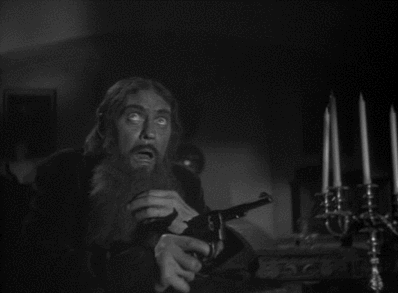
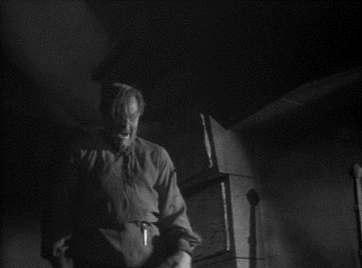
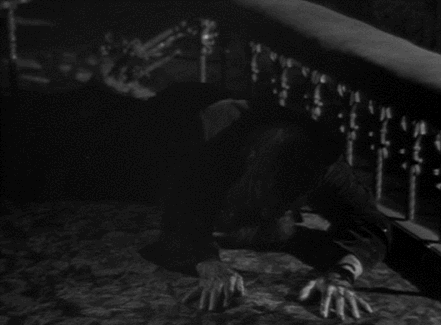
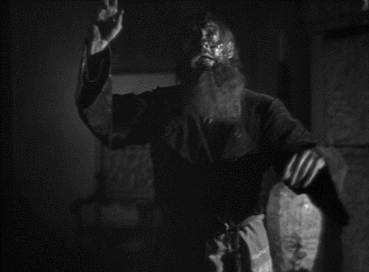
If the guignol sense of Rasputin’s death is a masterful explosion of frustration and anger, both at Rasputin’s manipulation and cruelty and the ugliness Russia had suddenly embodied, then it’s entirely at odds with the film’s stretched out ending, which takes the aforementioned fetishization of the Czar’s to new heights, as well as heaping doses of foreshadowing the Revolution in case audiences at the time had forgotten that that had happened.
It’s more funny than not, like when the effete Czar Nicholas (Ralph Morgan) says that the Romanovs will be safe because ‘the people have never hurt as and we’ve never hurt them’– which brings to mind the assassination and massacre but three acts earlier. Alas, the Commies take over and ignore the gentle kindness of Nicholas and instead take his family out to a yard and gun them down. The massacre of the Romanov family is met with the appearance of a cross and strings of holy holies played to the hilt while the words ‘The End’ appear. MGM making the Romanovs into Christ-like figures is a pretty big insult to millions of people who chafed under their rule, but reflected the general Western belief that Communists were godless heathens out to destroy religion more than help people.
End spoilers.
As preachy and unconnected that Rasputin is, the truth is that its focus is simply too lopsided to work smoothly. Ethel’s part as the Czarina, while imbuing in her a definite burden as the leader of a country, never gives her that religious fervor needed to convince us that she really believes and trusts in Rasputin– and Lionel never comes across as a subtle schemer. In fact, the film’s Rasputin in some scenes feels like a John Belushi character from several decades hence, stuffing his stomach, leering at woman, and mincing about with a feverish glee. Perhaps a better title would have been National Lampoon’s Rasputin House.
Of the Barrymores, John probably comes off the best, though truth be told it’s more from his climactic desperation and straitlaced role as opposed to his brother and sister. One thing I’ve noticed during the collaborations between John and Lionel is that John really can’t ever hide his bemusement when Lionel does something to try and steal the scene from him– every time, a little smirk pops up, a genuine appreciation for his older brother’s ploys. It’s bad for the movie’s immersiveness, for sure, but it’s cute to take note of.
Diana Wynyard, who unfortunately gets the brunt of a weak role here, does nothing with it; her Natasha, who is supposed to transition from devoted fanatic of Rasputin to horrified victim never changes, and instead looks constantly either horrified or wide eyed and bored. C. Henry Gordon makes an appearance as ‘the guy who is always wrong about everything’, a role that would become more common as the 30s wore on. Edward Arnold has a nice part as the Czar’s physician who helps Chegodieff try and poison Rasputin to no avail.
The film is fun if just for watching everyone bounce off one another and some great camerawork. Besides the pieces outlined above, directors Brabin and Boleslawski make Rasputin seem well ahead of its time by foregrounding elements to create a sense of unease. This works especially well in the hypnotism scenes, creating a visible sense of disorientation and serve as the few times that Rasputin comes across as menacing rather than silly. And, again, the action scenes are beautifully wrought.
So if you don’t mind watching three Barrymores battle each other for generous portions of scenery, Rasputin and the Empress is a fun time. It serves as both a celebration of Russian excess and a warning against charlatans, though coming from an MGM puff piece about a royal monarchy, it’s hard to take terribly seriously.
In the end, it’s a version of the Russian Revolution where Czar Nicholas was just a nice mug trying to do his job. Which only makes the movie funnier.
Gallery
Hover over for controls.
Trivia & Links
- This film is rather infamous for inspiring the hallmark movie notification, “This motion picture is a work of fiction and any resemblance to persons living or dead is purely coincidental.” That’s because the inspiration for the characters of Prince Chegodieff and Natasha, Prince Felix Yusupov and Irina respectively, were still alive in 1932. The original cut of the movie included a much more explicit scene indicating that Rasputin raped Natasha, and so Irina sued MGM for libel and won to the tune of over a million dollars. The book Rasputin in Hollywood by David Napley goes into the trial further.
- Glenn Erickson explains how the painful financial settlement wasn’t the only repercussion of MGM’s artistic license:
The other consequence of the lawsuit is right here on Warners’ disc. The Princess also demanded that any reference in the film to Princess Natasha’s rape be excised. That left MGM with no choice but to shorten one pre-rape scene, and then snip out other speeches later on: when Rasputin discusses his hold over the Princess; when the Princess tries to explain that she’s damaged goods and cannot marry Paul; when Alexandra finds out. Without knowledge of the lawsuit, viewers can’t be expected to understand what’s going on … Natasha is all brightness and light in the first half of the film, and for the second half stares into space like one of the Brides of Dracula. This Rasputin must be a real Dastard, I kid you not.
- If you want to read Yusupov’s memoirs, you can do so here. Chapter XXI has him discuss Rasputin, while chapters XXII and XXIII concern the fateful night of the mad monk’s murder.
- The entire TCMDB article is well worth your time as it focuses on the madcap behind-the-scenes action.
In the midst of this furor, Ethel had to learn how to act for talking films. After one scene in which she moaned, flailed about and pulled on the curtains on the set, John asked her, “What the hell are you doing?” “I haven’t the faintest idea,” she replied. Finally, Lionel gave her some advice that worked. He told her to whisper so that her stage-trained voice wouldn’t overpower the sensitive microphones. She whispered so effectively that most critics praised her for her subtle underplaying and the sense that there was always something she wasn’t saying. Ethel was also distracted by all the activity on the set. For intimate scenes, she insisted that black screens be put up so she wouldn’t have to see anybody working behind the scenes.
But nothing could distract the three Barrymores from their favorite pursuit – upstaging each other. Ethel had a knack for finding just the right moment to handle a prop or costume piece so as to draw focus from her brothers. John spent most of his scenes refusing to look at Lionel. But the latter came out the winner, thanks to his makeup job. One critic even commented that he played so much with his beard in the film that it almost became a fourth Barrymore.
- Reading through the New York Times review which is mostly fawning, I liked this end note, which opens a whole world of possibilities to which Mordaunt was referring to:
Lionel Barrymore leaves no stone unturned to give a vivid idea of the repellent monk. Yet he never overacts. In fact, his interpretation is far more restrained than the foreign pictures concerned with Rasputin.
- Cin-Eater disagrees with my assessment of Ethel’s part as the Czarina here. To wit:
It’s Ethel herself that saves the role — and in some ways the film itself — by imbuing her character with such a powerful sense of melancholy that you intuitively understand her to be the worried mother of not only a terribly fragile child, but of an equally troubled country. More than either of her brothers, it’s Ethel’s performance that serves of a constant reminder of the socio-political tumoil that serves as a backdrop for the movie’s smaller human dramas
- The Acidemic Film Blog spends most of their review talking about how great Svengali is (I won’t disagree), and then ponders a bit more about the cast and the casting:
But man, how much better it would be if Lionel had switched roles with brother John, who’s more or less wasted as the straight man? Was Rasputin too much like Svengali, who John played so ham-finitively the year before at Warners? Meanwhile sister Ethel Barrymore is pretty underused, looking the most hungover, which is saying a lot.
- Ethel Barrymore, who stuck to the stage for this period of her life, made this movie after a 6 year gap between films and wouldn’t make another one until 1944. This is the only film the three Barrymores made together. John and Lionel can also be seen together in (from best to worst) Arsene Lupin, Grand Hotel, Dinner at Eight, and Night Flight.
- This post is part of the Russia in Classic Film blog-a-thon hosted by Movies, Silently. Click here to see more cool entries about Russia on film!
Awards, Accolades & Availability
- This film is available on Amazon and Warner Archive.
Comment below or join our email subscription list on the sidebar! |
||
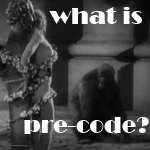 |
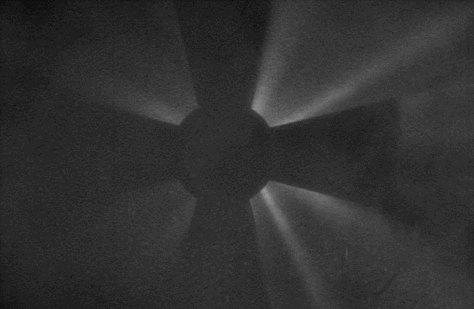 |
 |
 |
 |
|

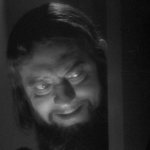
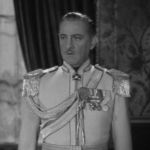
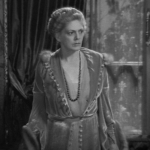
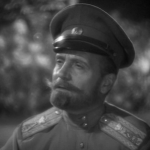
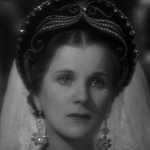
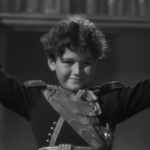
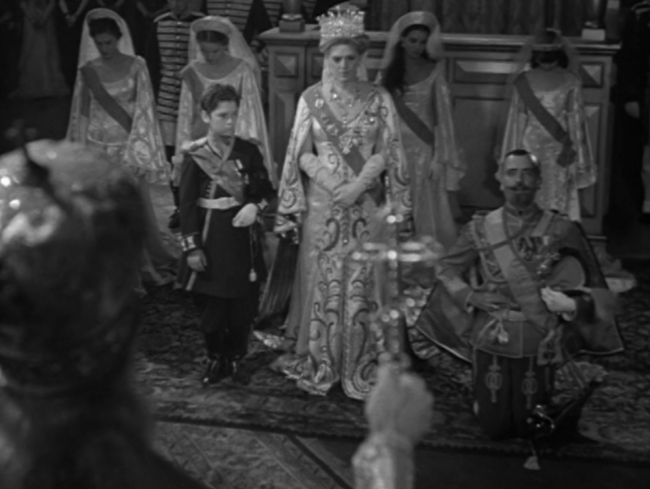
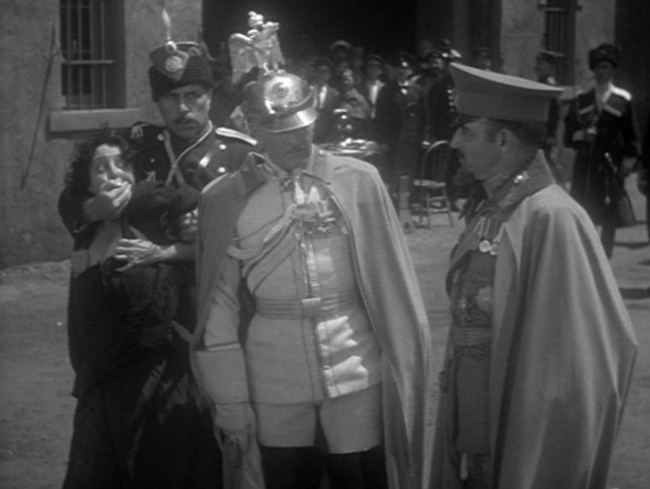

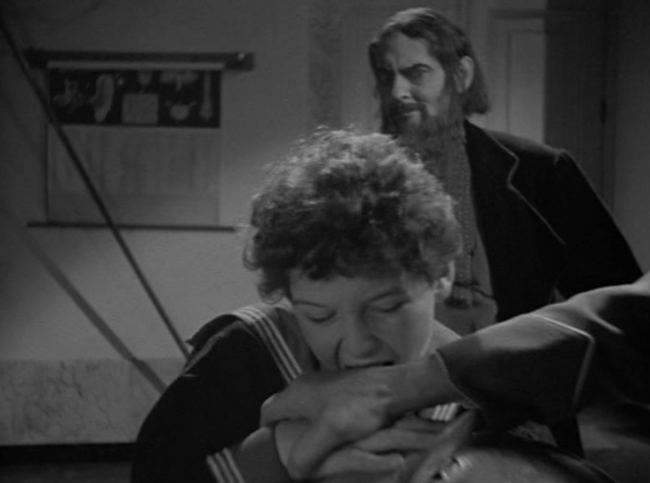
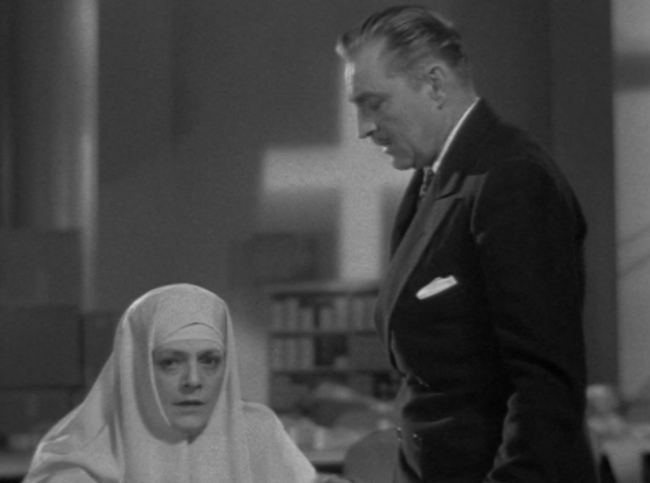
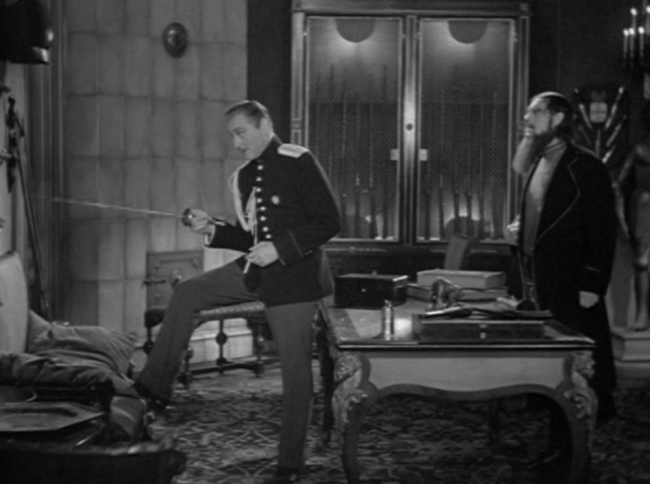
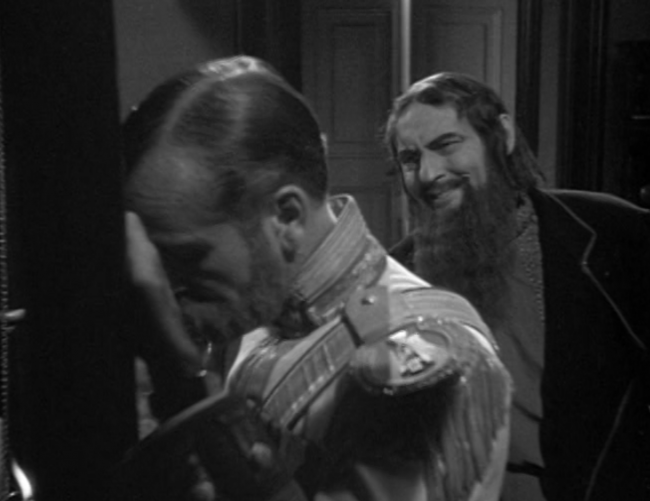
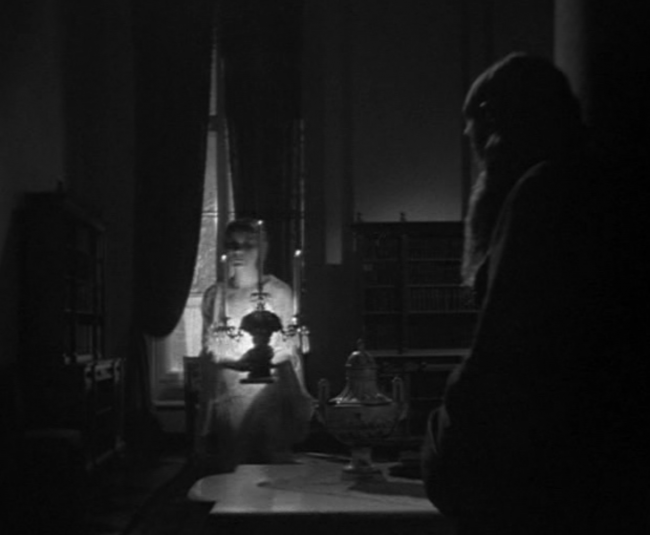
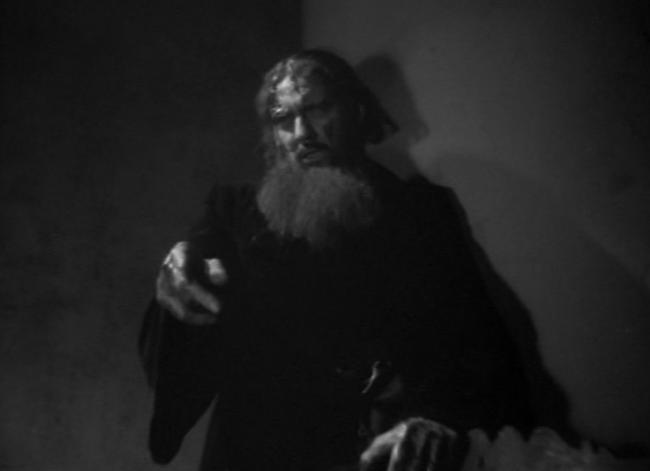
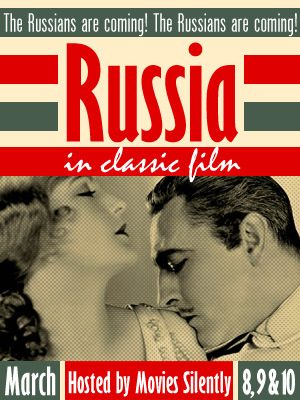



17 Comments
realthog · March 9, 2015 at 1:35 am
Great writeup — many thanks! I’m now athirst to see the movie . . .
Danny · March 10, 2015 at 11:10 pm
It’s a fun one, and, luckily, not too rare.
Judy · March 9, 2015 at 3:28 am
I saw this film a while back and all I really remember now is Lionel’s no holds barred performance as Rasputin – plus the excitement of seeing all 3 Barrymores together. I must revisit it and try to focus more on the Russian history, with your thoughts here in mind. A great contribution to the blogathon.
Danny · March 10, 2015 at 11:20 pm
Lionel certainly lets loose– though I’m not sure if that’s scene stealing or just pure ham on screen. If you do revisit, enjoy!
Dan Day Jr. · March 9, 2015 at 9:46 am
I have to admit I’ve always wondered how this film would have turned out if the Great Profile had played Rasputin instead of Lionel. When you think about it, John as Svengali is kind of a trail run for Rasputin.
Danny · March 10, 2015 at 11:21 pm
I think one of the reviews I quoted pondered that too. I think John would have made Rasputin too likeable (which some may say he is in Svengali), which would probably throw off the balance a bit. Now let’s be honest, the real coup would have been Ethel as Rasputin… that would have been something to see.
Movies Silently · March 9, 2015 at 11:12 am
Thanks so much for taking part. I agree with you about the Romanovs. Offering them sainthood in films shows an appalling lack of historical awareness. Bloody death + cute kids =/= Wise Ruler. And, yes, “WHY WON’T YOU DIE?” is should definitely be on everyone’s list of favorite things. 😉
Danny · March 10, 2015 at 11:36 pm
Thanks for the comment, Fritzi. It’s very silly mythologizing, which is why I like stuff like British Agent (34) more, since that at least admits to some amount of complexity in the proceedings that isn’t solely ‘good Americans/Romanovs’ versus ‘evil communists’.
Terence McArdle · March 9, 2015 at 12:02 pm
I saw this one about forty years ago on WTOP-TV9’s Cinema Club 9 in Washington, D.C. and about a year ago on TCM. One of the more pre-code aspects of this movie is the implication that Rasputin is a pedophile. At some point, Ethel’s czarina orders him out of the royal nursery. This may be an allusion to the rape of Natasha but, if that is the case, it is much creepier without the incident explicated. I agree with you about the simplistic and dishonest view of the Romanovs though I’m not sure that Nicholas And Alexandra is much better really. FWIW – Cinema Club 9 ran a lot of pre-code movies including many television premieres circa 1972-1973 long before Cable. The programmer was a film buff named Ray Hubbard who had some ties with the American Film Institute. First they had a series of Fox, RKO and 20th Century films that included Quick Millions, Zoo in Budapest, Bird of Paradise, Hell’s Highway, Blood Money and The Power and The Glory, then they got packages of Paramount, MGM and finally, WB as well as a bunch of silents. They used to publish program notes on the movies which they sent in the mail to their “club” as well as copies of production stills.
Danny · March 10, 2015 at 11:50 pm
That sounds awesome! I’m jealous of getting to discover those movies in such a carefully curated way.
And you’re completely right about the pedophilia undertones– Rasputin is obviously going after one of the girls when he’s caught by Natasha. I don’t know what else they could do to male the guy look bad in all honesty.
Joe Thompson · March 29, 2015 at 12:25 am
“reform which they were totally getting to in just a minute. Let them just finish starving everyone first” — good one. I grew up in a neighborhood with a lot of White Russians and their children and their view of the Romanovs was more realistic than this movie. I first heard about it when I read a book about the Barrymores. I think the jacket had photos of the siblings from ths movie on the cover. Whenn I got to see it, it was fun to see their scene stealing-fu. They were three masters. Thanks for sharing with all of us.
Danny · April 14, 2015 at 8:18 am
No problem. Glad you enjoyed it!
Edward Cascone · April 15, 2015 at 9:19 pm
I am a great fan of the Barrymore’s and have never seen this particular movie. When I watch these vintage flix I am always intrigued by the detail that is painfully sought after both by directors and actors. I wondered if someone could enlighten me as to why Ethel Barrymore wears a swastika medallion necklace? I am aware that it is an ancient mystical sign, but why here in this movie. Any thoughts on this?
thestarlightstudiosbcglobal.net · April 17, 2017 at 2:24 pm
The assassination scene was censored in several places before the film’s release. Really grisly stuff, if you can imagine.
Mark A. Vieira · December 31, 2019 at 1:09 pm
The scene was actually cut before the release. You can see a slight jump after the whacking with the poker. There was more. I read the Continuity Script. They cut about five minutes of this and that throughout the film. “I’m not interested in your anatomy,” John says to Lionel in his lair. Fun stuff like that was cut to appease Jason Joy and James Wingate at the Studio Relations Committee.
Ramón Jurado Borrero · December 30, 2019 at 4:52 pm
While it obviously won’t hold a candle to modern action films? Why must classic films, even when praised, must ALWAYS be compared unfavorably to modern films? I see this all the time. I finally got around to seeing this film and not only did I love it but I found Rasputin’s death scene to be great and it more than holds a candle, or many, to modern action films. The scene combines drama, horror(bloody rasputin getting up) and even humor(why won’t you die!) in a flawless way that doesn’t take away anything from any of its levels, in other words, it doesn’t fall into full comedy, or full horror. I’ve never seen that in any modern 21th century film, the killing end scene in There Will Be Blood for instance is nonsensical, anticlimatic, cringe worthy and you feel humiliated for Paul Dano, it’s just so macabre.
The more I watch pre-code and golden age films, the more it is modern films that compare unfavorably, not the other way around.
As far as the movie itself, watching classic films like this have made me realize just how irrelevant historical accuracy actually is. It certainly isn’t an artistic merit in itself. Still, this film manages to convey years of history in mere lines, and conveys the bulk of this story, that is real storytelling, less is more.
Lionel Barrymore is amazing as Rasputin, a truly incredible performance, and why is it not the definitive Rasputin or Lionel Barrymore performance? It was that compelling for me.
Sad this film is totally forgotten about, it shouldn’t be, but I guess fans putting it down is not going to help its cause, but I liked it.
Mark A. Vieira · December 31, 2019 at 1:07 pm
Oh, God bless you! Your articulate letter is the perfect ending to a year of marketing my pre-Code book. This is the film that I most often cited. And, as far as onscreen action is concerned, the violent scene-stealing that occurs between Barrymore siblings is not to be discounted.
This film is nearly ninety years old, made with mechanical technology that in some cases no longer exists, but it’s still watchable because of an element that cannot be manufactured, engineered, or quantified. That element is star quality.
Watch John Barrymore stride into the hospital. Watch Ethel splay her fingers in a ballet-like gesture. Watch Lionel chuckle to himself. There is no CGI that can create effects like these.
Are their performances occasionally over the top? Of course. These are veterans of Broadway adapting to a new medium. Are their antics enjoyable? Yes. Would pre-Code films be as entertaining if they were performed by “Method” actors? I doubt it.
Rasputin and the Empress is not truly forgotten. The plays that Ethel Barrymore did before and after this film are truly forgotten. This film, which was — like all Hollywood films of that time — consigned to the vault, has survived a libel suit, a nonexistent reissue program, and changing tastes, only to bounce back on TV in the fifties; on college campuses and in repertory theaters in the sixties and seventies; on VHS and cable in the eighties; on DVD in the 2000s; and, now in streaming.
Not even Irving Thalberg could have foreseen that his brainstorm of co-starring three Barrymores would be seen and discussed in 2019. I wish he — and you — could have seen me on the stage of the Los Angeles Public Library in June. I was defending this film against the tirade of a young woman who described it as the worst pre-Code movie. Yes! That’s why I love it!
Mark A. Vieira
Author,
Forbidden Hollywood
Sin in Soft Focus
Comments are closed.